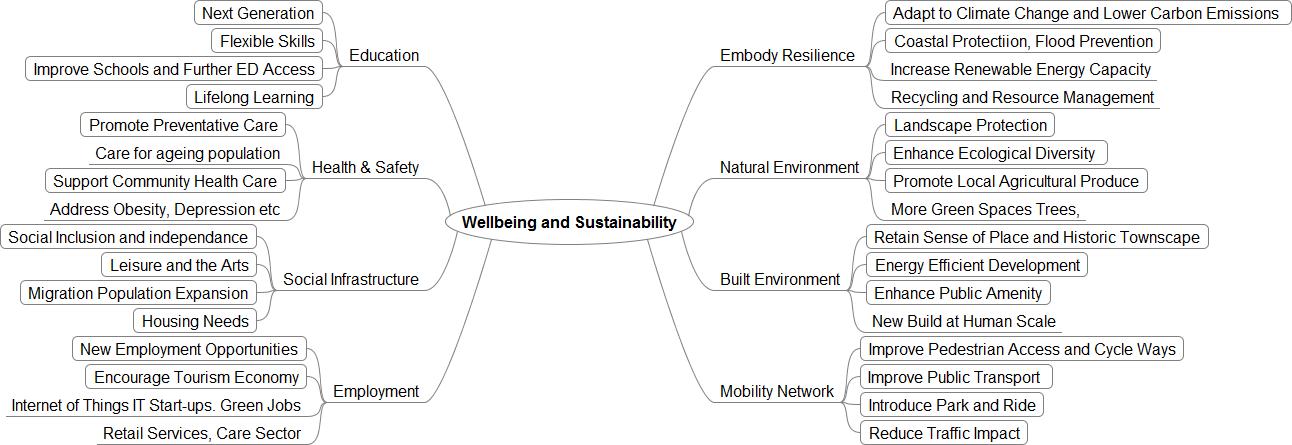.
Sidmouth has been a Transition Town since 2008:
The Vision Group has also taken on the ‘Sustainable Sidmouth’ brand to reflect this membership of the larger community transitioning to a more sustainable way of life:
Sustainable Sidmouth and the Transition Town movement
.
In 2020, the Vision Group will be working with other groups on the ‘Sidmouth 2020’ project.
It’s all about ‘green growth’, sustainability and creating resilience:
Sustainability issues and projects in Sidmouth:
The Neighbourhood Plan is a part of how we will achieve sustainability in Sidmouth.
Food, the production and delivery of and the contamination of, is obviously a sustainability concern. How to keep soils fertile and avoid our food actually poisoning us instead of nourishing us has been a problem since man began farming. We now have the problem of ‘food miles’ to address too.
The VGS was instrumental in forming and running the Farmers’ Market and starting the Sidmouth Food Festival, it is now run by Kennaway House.
Other strands are Energy, Transport, the Built Environment and protecting the environment, including Recycling.
With a view to protecting the environment VGS is supporting Sidmouth Plastic Warriors in their campaign to reduce plastic use in Sidmouth.
.
The Neighbourhood Plan:
‘Made’ in November 2019, this forms the basis of much of these projects going forward into 2020:
Sidmouth Neighbourhood Plan (made)
VGS member Graham Cooper also sat on the Neighbourhood Plan steering group. Here are his mind-maps of how sustainability issues and the NP work together:
.

.

.
Here are some external resources to draw on:
Sustainable growth index | grantthornton.co.uk
Reconomy: Understanding and influencing your local economy (Transition Network)
REconomy Project: Building Resilient Local Economies (USA)
LOCAL ECONOMIC RESILIENCE | resilience.org
friendsprovidentfoundation.org
.
Finally, it is not always that clear-cut, as this personal view suggests:
.
Mixed messages and avoiding responsibilities
It is incontrovertible that the earth can not sustain our current lifestyles and that certain things we do make matters worse. And yet …….
Flying around the world for fun or to bring exotic foods to tempt the palate is very much alive and acceptable.
The power-hungry phone and internet systems are constantly upgraded to consume more power.
Cheap fashion poisons and dries up rivers, lakes and seas in the producing countries and creates waste disposal problems in the consuming countries.
Pressure groups tell us that drinking milk, eating animal products in general and using leather create a huge carbon footprint, yet the medical world claims that lack of things that can only be found in animal fats will lead to long term health problems.
So what are we to make of these mixed messages?
“Doing our bit”
Heathrow has come up with an interesting approach – trying to go ‘carbon neutral’
There was a ban from last year on plastic straws and stirrers, and on cotton buds with plastic stems
There is clearly no need for these, as several decades ago they were not made of plastic; and straws were a special treat for children not an indispensable aid for adults, as adults could drink from cups and mugs. Yet even such a sensible piece of legislation has some people acting with horror. Groups representing the disabled have said it is discriminatory as for some disabled people straws are necessary and so plastic straws must still be available; even though there are straws made of stainless steel, silicone and other materials which are even dishwasher safe and which many people choose to carry with them. Other people say it is useless to enact such small changes yet small changes add up to large differences.
Taking responsibility
The only way our unsustainable way of life can change is by people being willing to take individual responsibility for their own carbon footprint.
Don’t engage in mindless consumption: do what we were taught in the 60s. which is instead of impulse buying, go home and think about it for 3 days to a week and if it is still something you can’t live without go back and buy it . Go to the shops and try it on if it is clothing, rather than buying several sizes and returning the unwanted ones which creates unnecessary delivery van movements.
Here is a very helpful book which provides such helpful practical tips for trying to do our bit and take some responsibility:
